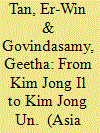|
|
|
Sort Order |
|
|
|
Items / Page
|
|
|
|
|
|
|
| Srl | Item |
| 1 |
ID:
116680


|
|
|
|
|
| Publication |
2012.
|
| Summary/Abstract |
The recent death of Kim Jong Il and the succession of his son, Kim Jong Un, as Supreme Leader of the Democratic People's Republic of Korea leaves the Northeast Asian region at a crossroads. Given the younger Kim's lack of political experience, it is reasonable to believe that his priority will be on consolidation of his political and military power base in Pyongyang. More recently, the Democratic People's Republic of Korea (DPRK) has sent mixed signals with regard to its intentions. On the one hand, North Korea has agreed to a moratorium of its nuclear activities and has even invited the IAEA to inspect its nuclear facilities; at the same time, however, the DPRK has also announced its plan to launch a satellite in mid-April, using technology derived from the Taepodong missile. Set against this backdrop, we underline and comparatively assess the importance of the USA, the Republic of Korea, and China, all of which will be going through a political transition in 2012. We conclude that Seoul and Beijing are in the best position to reopen the process of dialogue with the DPRK.
|
|
|
|
|
|
|
|
|
|
|
|
|
|
|
|
| 2 |
ID:
187451


|
|
|
|
|
| Summary/Abstract |
The idea that a change of government can alter the foreign policy orientation of a state is nothing new in international relations. This paper presents a preliminary investigation into the causal linkages between domestic political regime changes and foreign policy restructuring in Malaysia and South Korea. It assumes that regime changes allow for a greater propensity for the recalibration of foreign policy interests. Since the effectiveness of any bilateral cooperation depends on successful formulation and implementation, this paper dissects the transition, convergence and challenges in bilateral cooperation between the two countries. Both Mahathir Mohamad and Moon Jae-in saw a necessity to diversify economic partners that had resulted from the policies of previous administrations. While the basic elements of their foreign policy remained the same, both Malaysia and South Korea reevaluated their policies with regard to the international issues affecting their domestic interests. While relations had once been transactional at best, the convergence of the Look East Policy (LEP) 2.0 and the New Southern Policy (NSP) advanced bilateral relations for 22 months until the collapse of Mahathir’s government in 2020.
|
|
|
|
|
|
|
|
|
|
|
|
|
|
|
|
| 3 |
ID:
118418


|
|
|
|
|
| Publication |
2013.
|
| Summary/Abstract |
The death of North Korean leader Kim Jong-il in 2011 presents Russian president Vladimir Putin with an opportunity to regain influence on the Korean peninsula. Over the long term, Russia may reemerge as a great power in the Asia Pacific region in line with Russian geostrategic interests. Since the collapse of the Soviet Union, Russia has been marginalized on major issues in Northeast Asia. The prospect of a consistent, long-term North Korea policy under Putin places Moscow in a strong position to sustain the process of engagement with North Korea. More significantly, it serves Moscow's demographic, economic, and security interests to be a positive influence in the region in order to regain a diplomatic role in any security initiatives concerning the Korean peninsula. In this article, we argue that if and when the Russian Far East is developed, Moscow would be in a position to offset the regional strategic and economic dominance of the United States and China.
|
|
|
|
|
|
|
|
|
|
|
|
|
|
|
|
|
|
|
|
|